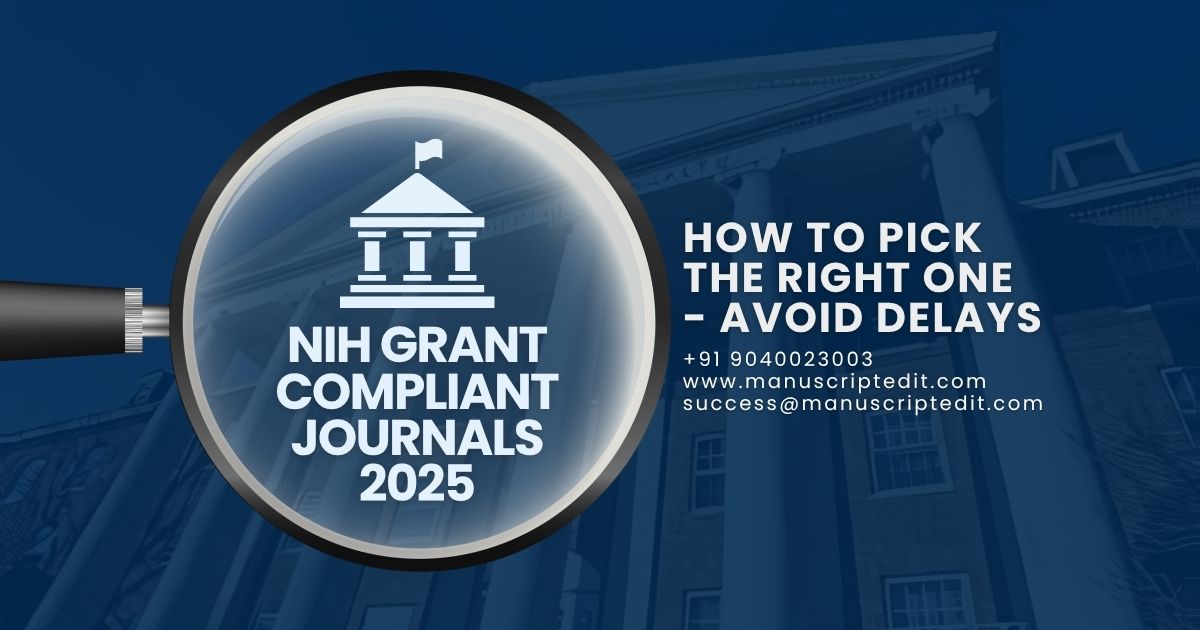
Why Choosing the Right Journal Matters in 2025
Starting July 1, 2025, the National Institutes of Health (NIH) has a new rule: all research funded by NIH grants must be freely available right after publication, with no delays (NIH Notice NOT-OD-23-091). This affects researchers in the U.S., India, the UK, and the EU who work on NIH projects. Picking the wrong journal can cause delays, funding issues, or even rejected papers. This blog explains how to choose NIH grant-compliant journals to keep your research on track. Download our free checklist and cover letter template to make it easy.

What Is an NIH-Compliant Journal?
An NIH grant-compliant journal lets you share your final manuscript (called the Author Accepted Manuscript or AAM) in PubMed Central as soon as it’s published. This follows the NIH public access policy 2025, which requires no delays (zero-embargo publishing). Researchers outside the U.S., like those in India or the EU working with U.S. teams, must follow this rule too. Here’s what makes a journal compliant:
- No Delay: The journal allows instant sharing in PubMed Central.
- Open License: Uses a CC BY license so anyone can share your work.
- Repository Rules: Lets you upload your final manuscript without restrictions.
Picking a non-compliant journal can delay your funding or get your paper rejected. ManuscriptEdit’s formatting services makes sure your paper meets NIH rules.
Red Flags: Journals That Cause Problems
Some journals don’t follow NIH rules and can cause trouble. Big publishers like Elsevier, Wiley, ACS, and IEEE, often used by researchers in India and Europe, may have delays (like 6 or 12 months) that break the zero-embargo rule. Watch out for:
- Delayed Journals: Journals like The Lancet or Nature may not allow instant sharing, which violates NIH rules.
- Hidden Fees: ACS might charge $2,500 for open access but still delay PubMed Central uploads.
- Hybrid Journals: Some journals offer open access but still delay sharing, which isn’t NIH-compliant.
These mistakes can delay your funding or paper. ManuscriptEdit’s tools help researchers in India and Europe find NIH-compliant journals to avoid these issues.

Good Choices: Journals That Work with NIH Rules
Choosing NIH-compliant journals makes it easy to follow open access rules. Publishers like PLOS, SAGE, AAAS (Science), and eLife allow instant sharing and green open access, perfect for NIH-funded researchers. Some examples:
- PLOS ONE: Lets you share your manuscript in PubMed Central right away with a CC BY license.
- eLife: Supports no-delay sharing, great for UK and EU researchers.
- SAGE Open: Offers compliant options for Indian institutes like IISc and AIIMS.
Researchers at places like Oxford, Max Planck, or CNRS working on NIH projects can use these journals. ManuscriptEdit offers a free check to ensure journals meet NIH rules.
International Researchers: What You Need to Know
Indian researchers at AIIMS or IISc, or UK/EU researchers at Imperial or CNRS, working with NIH-funded U.S. teams must follow NIH rules. Some local or hybrid journals have hidden delays that can cause problems. Here’s what to do:
- Check Before Submitting: Make sure the journal has no delays.
- Plan for Costs: Be ready to pay Article Processing Charges (APCs) or use free open access options.
- Follow U.S. Rules: EU/UK co-authors must meet the same no-delay rule.
Checking journals early prevents delays. ManuscriptEdit’s tools help international researchers follow the NIH public access policy 2025.
NIH Journal Selection Checklist [Free Download]
Use our simple 1-page checklist before submitting to ensure your journal follows the 2025 no-delay rule. It checks:
- Journal delay policies
- Open access license (like CC BY)
- PubMed Central upload permissions
This checklist works for researchers everywhere, from the U.S. to India. Download it now to avoid mistakes.

Bonus: NIH-Compliant Cover Letter Template
Use this cover letter with your submission to show you follow NIH rules for PubMed Central and no delays. It works for researchers in the U.S., India, or anywhere.

How ManuscriptEdit Can Help
ManuscriptEdit helps researchers in Asia, Europe, and North America stay NIH-compliant. We offer:
- Free Journal Matching: Finds journals that follow NIH rules for your paper.
- PubMed Formatting: Makes sure your manuscript fits PubMed Central’s rules.
- Compliance Checks: Confirms journal policies on delays and licenses.
Upload your paper for a free NIH journal match and avoid delays.
Conclusion: Publish Smart, Keep Your Funding
The NIH public access policy 2025 makes picking NIH grant-compliant journals crucial to avoid delays and protect your funding. Whether you’re in Boston or Bangalore, use our free checklist and cover letter to follow the no-delay rule.
ManuscriptEdit’s tools and support help you publish easily and keep your research visible. Start now to stay funded.



